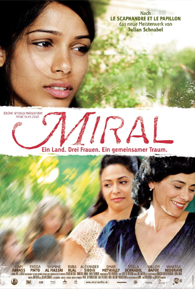
Fresh from Basquiat and The Diving Bell and the Butterfly, Julian Schnabel takes on this heady, difficult topic. Helpfully, the film traces the unfortunate lives of three generations of Palestinian women following the 1948 Israeli-Palestinian war, beginning with a Mother Teresa figure called Hind Husseini, who sets up a boarding house, school, and charity for orphaned children, indoctrinating them with her firm belief that education is the only solution to their problems – not terror or war. Miral, a child of the long and unjust occupation, represents Mama Hind’s last hope for peace at the dawn of the first Intifada but will she choose the path of non-violence?
Possibly the outcome of the autobiographical aspects of Rula Jebreal’s novel and a guilt complex at work (Schnabel’s mother was the president of a Zionist organisation), Schnabel’s film adaptation of Miral aims at explaining Palestinian rage to a world used to seeing them as terrorist, offering a peace branch to Israeli-Palestinian relations, and depicting the brutal truth of Israeli occupation of Palestine through Arab eyes and interspersed with actual news footage.
Perhaps there was hubris involved as well; Schnabel’s film comes across as alternatively condescending and hectoring at times, especially when his characters devolve into portentous speeches about injustice or peace which come across as emotionally divorced and unconvincing compared to the gut-wrenching, visceral details presented on screen moments ago.
Miral is a film whose heart is in all the right places, whose courageous good intentions constantly threaten overwhelm its execution. Very roughly shot and edited, the biopic has a gut-wrenching quality. Don’t watch this on a full stomach. Do go wearing your heart on your sleeve.












 打印版本
打印版本










读者回应
抢先发表第一个回应吧!
请先登入再使用此功能。